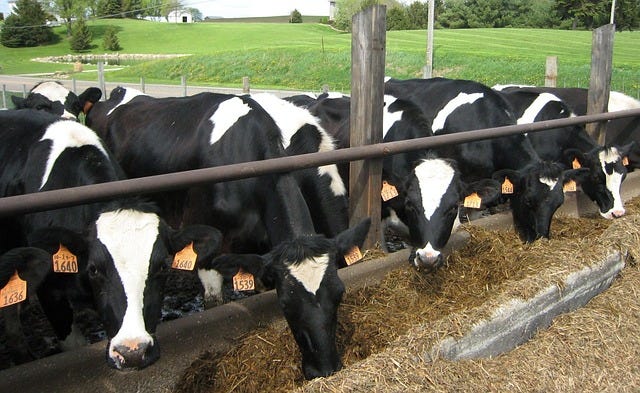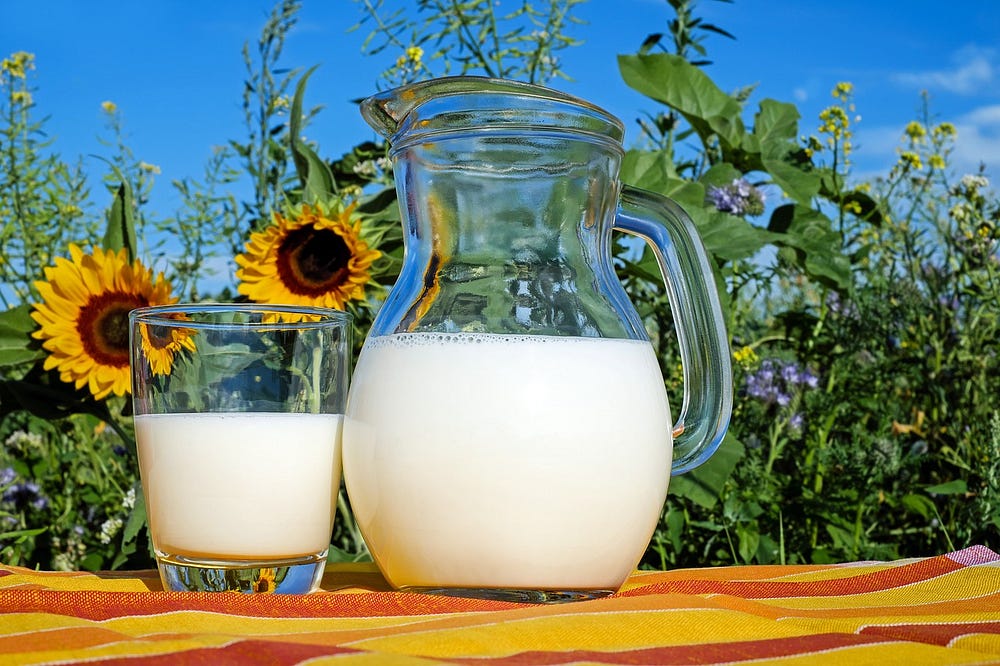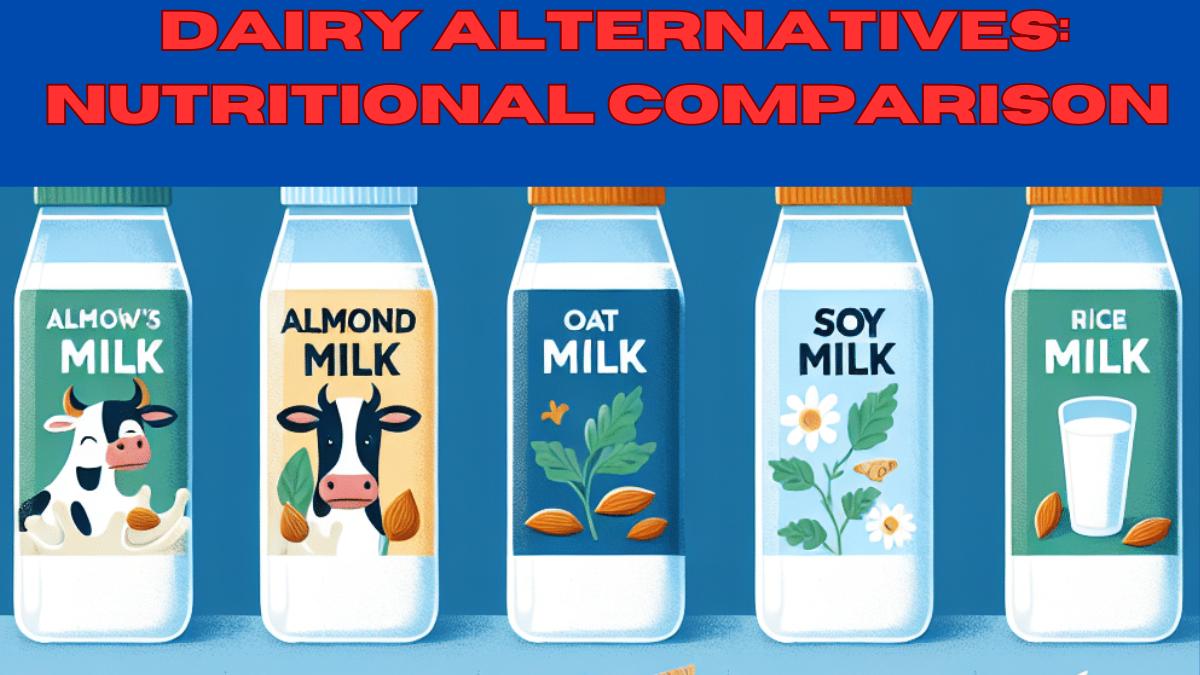Meta Description
Curious about dairy alternatives? Compare the nutritional benefits of almond milk, oat milk, soy milk, and more in this comprehensive 2024 guide. Choose the best option for your health and lifestyle!
Introduction
In a world where dietary choices are evolving rapidly, dairy alternatives have surged in popularity. From almond milk to oat milk, soy milk to cashew milk, the variety is both exciting and overwhelming! Whether you’re lactose intolerant, vegan, or just exploring healthier options, understanding the nutritional differences is key to making informed choices.
Did you know that some plant-based milks pack more calcium than cow’s milk? Others may lack protein or essential nutrients like B12, making it crucial to assess their nutritional profiles carefully. In this article, we’ll break down the pros and cons of popular dairy alternatives and help you choose the one that best aligns with your health goals.

Main Headings and Bullet Points
1. Why Choose Dairy Alternatives?
- Rising lactose intolerance rates and dairy sensitivities.
- Ethical and environmental concerns around dairy farming.
- The growing trend toward plant-based and vegan diets.
2. Almond Milk
- Low in calories but lacks protein.
- Rich in vitamin E, a powerful antioxidant.
- Often fortified with calcium and vitamin D.
- Environmental considerations: High water usage in almond farming.
3. Soy Milk
- Closest nutritional profile to cow’s milk with high protein content.
- A good source of calcium, vitamin D, and potassium (if fortified).
- Contains isoflavones, which may benefit heart health and hormone balance.
- Potential allergen for some individuals.
4. Oat Milk
- Creamy texture and naturally sweeter taste.
- Higher in carbohydrates compared to other alternatives.
- Often enriched with vitamins and minerals like B12, calcium, and iron.
- Lower environmental impact compared to almond or dairy milk.
5. Coconut Milk
- Rich in healthy fats but low in protein.
- Offers a distinct flavor ideal for cooking and smoothies.
- Often fortified to enhance calcium and vitamin D levels.
- Sustainability concerns due to the high demand for coconuts.
6. Cashew Milk
- Ultra-creamy texture, great for coffee and desserts.
- Low in protein but often fortified with vitamins and minerals.
- Lower calorie option for those focusing on weight management.
7. Rice Milk
- Hypoallergenic and ideal for people with nut or soy allergies.
- High in carbohydrates and low in protein.
- May not naturally contain many nutrients unless fortified.
- Environmental impact: Higher water usage than most plant-based options.
8. Comparing Nutritional Profiles: A Side-by-Side Chart
- Calorie, protein, carbohydrate, and fat content for each alternative.
- Fortification levels: Calcium, vitamin D, B12, and other key nutrients.
- Best options for specific needs (e.g., high protein, low calorie, allergies).
9. Key Factors to Consider When Choosing a Dairy Alternative
- Dietary Needs: Protein intake, calorie control, or nutrient deficiencies.
- Taste and Texture Preferences: Creaminess, sweetness, or neutral flavor.
- Sustainability: Environmental impact of production and sourcing.
- Allergens: Common triggers like nuts, soy, or gluten.

1. Why Choose Dairy Alternatives?
- Rising Lactose Intolerance Rates and Dairy Sensitivities:
Many individuals experience difficulty digesting lactose, the sugar found in cow’s milk, leading to symptoms like bloating, gas, and discomfort. Dairy alternatives provide a lactose-free solution for those with intolerances or sensitivities. - Ethical and Environmental Concerns Around Dairy Farming:
Concerns over animal welfare and the environmental impact of dairy farming, such as greenhouse gas emissions and water usage, have prompted a shift toward more sustainable options like plant-based milk. - The Growing Trend Toward Plant-Based and Vegan Diets:
The rise of plant-based lifestyles has made dairy alternatives more mainstream. They align with vegan diets and appeal to health-conscious consumers looking for cleaner, cruelty-free food choices.
Choosing dairy alternatives isn’t just a dietary decision — it’s a lifestyle shift that supports personal health, ethical values, and environmental sustainability.
https://www.youtube.com/watch?v=ng3lPg4DFv0
2. Almond Milk
- Low in Calories but Lacks Protein:
Almond milk is a popular choice for those aiming to reduce calorie intake, but it provides only a small amount of protein compared to cow’s milk or other plant-based alternatives. - Rich in Vitamin E, a Powerful Antioxidant:
One of almond milk’s key nutritional benefits is its high vitamin E content, which supports skin health and protects cells from oxidative stress. - Often Fortified with Calcium and Vitamin D:
Commercial almond milk is typically fortified with calcium and vitamin D, making it a suitable substitute for cow’s milk in terms of bone health. - Environmental Considerations: High Water Usage in Almond Farming:
While almond milk is plant-based, its production requires significant water resources, raising concerns about sustainability in areas with water scarcity.
Almond milk is an excellent low-calorie option, but its environmental impact and low protein content may require careful consideration depending on your priorities.

3. Soy Milk
- Closest Nutritional Profile to Cow’s Milk with High Protein Content:
Soy milk stands out among plant-based options for its protein content, offering levels similar to cow’s milk and containing all essential amino acids. - A Good Source of Calcium, Vitamin D, and Potassium (if Fortified):
Fortified soy milk provides vital nutrients such as calcium and vitamin D, supporting bone health, and potassium, which helps maintain healthy blood pressure. - Contains Isoflavones, Which May Benefit Heart Health and Hormone Balance:
Isoflavones in soy milk are plant-based compounds that may improve heart health by reducing cholesterol levels and supporting hormonal balance, particularly during menopause. - Potential Allergen for Some Individuals:
Soy is a common allergen, and some people may need to avoid soy milk due to allergic reactions or sensitivities.
Soy milk is a well-rounded dairy alternative with significant health benefits, making it a favorite for those seeking a protein-rich, nutritionally comparable substitute for cow’s milk.
https://www.youtube.com/watch?v=pBi5NkE8O3A
4. Oat Milk
- Creamy Texture and Naturally Sweeter Taste:
Oat milk is prized for its rich, creamy texture and slightly sweet flavor, making it an excellent choice for coffee, baking, and smoothies. - Higher in Carbohydrates Compared to Other Alternatives:
With its higher carbohydrate content, oat milk can provide a quick energy boost, but it may not be ideal for low-carb diets. - Often Enriched with Vitamins and Minerals Like B12, Calcium, and Iron:
Many oat milk brands fortify their products with essential nutrients such as vitamin B12, calcium, and iron, supporting bone health and energy production. - Lower Environmental Impact Compared to Almond or Dairy Milk:
Oat milk is a more sustainable option, requiring less water and land to produce than almond or dairy milk, making it a better choice for eco-conscious consumers.
Oat milk’s creamy consistency and nutritional enhancements make it a versatile and environmentally friendly dairy alternative.

5. Coconut Milk
- Rich in Healthy Fats but Low in Protein:
Coconut milk is a good source of medium-chain triglycerides (MCTs), which may support energy metabolism and brain health. However, it lacks significant protein content compared to other dairy alternatives. - Offers a Distinct Flavor Ideal for Cooking and Smoothies:
With its unique, tropical taste, coconut milk is a popular choice for enhancing curries, soups, and smoothies, adding a rich and creamy texture. - Often Fortified to Enhance Calcium and Vitamin D Levels:
Many commercial coconut milk products are fortified with calcium and vitamin D, ensuring they provide similar bone health benefits to cow’s milk. - Sustainability Concerns Due to the High Demand for Coconuts:
The rising demand for coconuts has raised environmental and ethical concerns, including deforestation and the exploitation of labor in some regions.
Coconut milk is a flavorful and versatile option, but its low protein content and sustainability challenges may require careful consideration based on your nutritional and ethical priorities.
6. Cashew Milk
- Ultra-Creamy Texture, Great for Coffee and Desserts:
Cashew milk is known for its smooth, creamy texture, making it an excellent choice for coffee, lattes, and desserts where a rich, velvety consistency is desired. - Low in Protein but Often Fortified with Vitamins and Minerals:
While cashew milk is low in protein, it is often fortified with essential nutrients such as calcium, vitamin D, and B12, making it a suitable dairy alternative for those looking to maintain a balanced diet. - Lower Calorie Option for Those Focusing on Weight Management:
Cashew milk is typically lower in calories than cow’s milk or other plant-based options, making it an attractive choice for those managing their calorie intake or seeking a light alternative.
7. Rice Milk
- Hypoallergenic and Ideal for People with Nut or Soy Allergies:
Rice milk is a great alternative for individuals with allergies to nuts or soy, as it is naturally free from these common allergens. - High in Carbohydrates and Low in Protein:
Rice milk is rich in carbohydrates, which provide a quick source of energy, but it is low in protein compared to other plant-based milk options. - May Not Naturally Contain Many Nutrients Unless Fortified:
While rice milk can be a versatile option, it often lacks essential nutrients like calcium, vitamin D, and B12 unless it is fortified by the manufacturer. - Environmental Impact: Higher Water Usage Than Most Plant-Based Options:
Rice farming requires substantial water resources, contributing to a higher environmental impact compared to other plant-based milk alternatives, such as oat or almond milk.
Rice milk is an excellent hypoallergenic choice but may not be the most nutrient-dense or environmentally sustainable option without fortification or careful sourcing.
8. Comparing Nutritional Profiles: A Side-by-Side Chart
Key Nutritional Insights:
- Calorie Content: Almond and cashew milk are among the lowest-calorie options, making them suitable for weight management. Soy and oat milk, on the other hand, offer a more substantial nutritional content.
- Protein Levels: Soy milk leads with the highest protein content, followed by almond milk. Rice and coconut milk are low in protein.
- Carbohydrates: Oat milk is high in carbohydrates, which may be a benefit for those needing a quick energy source. Rice milk also has a high carbohydrate count, while others like almond milk are much lower.
- Fat Content: Coconut and cashew milk provide healthy fats, while other options like soy and oat milk offer moderate fat levels.
- Fortification: Most plant-based milks are fortified with calcium and vitamin D, but levels can vary. Soy milk often also has added B12 and potassium, making it a nutritionally complete choice.
Best Options for Specific Needs:
- High Protein: Soy milk is the top choice for those seeking a protein-rich option.
- Low-Calorie: Almond milk and cashew milk are ideal for those looking to limit calorie intake.
- Allergies: Rice milk is hypoallergenic, making it a great option for those with nut or soy allergies.
- Sustainability: Oat milk has a lower environmental impact compared to almond and coconut milk.

9. Key Factors to Consider When Choosing a Dairy Alternative
- Dietary Needs:
- Protein Intake: If you require a higher protein intake, soy milk is your best option, offering the most protein per serving.
- Calorie Control: Almond and cashew milk are lower in calories, making them suitable for weight management or low-calorie diets.
- Nutrient Deficiencies: Fortified options like oat, soy, and almond milk can help address calcium, vitamin D, and B12 deficiencies.
- Taste and Texture Preferences:
- Creaminess: For a creamy, rich texture, oat and cashew milks are ideal.
- Sweetness: Oat milk has a naturally sweeter taste, while almond and coconut milk tend to have a more neutral flavor, and soy milk offers a more savory option.
- Neutral Flavor: Almond and rice milk are often chosen for their mild flavors, which pair well with a variety of dishes and beverages.
- Sustainability:
- Environmental Impact: Oat milk has a lower environmental footprint than almond and coconut milk, which require more resources for production. Almond farming, in particular, consumes large amounts of water, while rice milk’s water usage is also significant.
- Local Sourcing: Consider sourcing plant-based milk made from ingredients grown locally to reduce the carbon footprint.
- Allergens:
- Common Triggers: If you have allergies to nuts or soy, opt for rice milk, which is hypoallergenic. Coconut milk is also safe for most, though it’s not recommended for people with coconut allergies.
- Gluten Sensitivity: Most plant-based milks are naturally gluten-free, but always check for cross-contamination or additives, particularly in fortified versions.
Choosing the right dairy alternative depends on balancing your nutritional goals, taste preferences, environmental concerns, and any potential allergens. With a variety of options available, there is a suitable choice for every need and lifestyle.
https://www.youtube.com/watch?v=Psym3_MQBrc
FAQ: Dairy Alternatives — Nutritional Comparison in 2024
1. What are the most popular dairy alternatives in 2024?
The most popular dairy alternatives in 2024 include almond milk, soy milk, oat milk, coconut milk, rice milk, and cashew milk. Each offers unique flavors, textures, and nutritional profiles.
2. Which dairy alternative is the healthiest?
It depends on your dietary needs. Soy milk is high in protein, almond milk is low in calories, and oat milk is rich in fiber. For a balanced option, choose fortified versions that include calcium, vitamin D, and B12.
3. Are plant-based milk nutritionally comparable to cow’s milk?
Some plant-based milk, like fortified soy or almond milk, can match or exceed cow’s milk in calcium and vitamin D levels. However, most alternatives are naturally lower in protein and may lack other nutrients unless fortified.
4. Which dairy alternative is best for people with allergies?
Rice milk is a hypoallergenic option, suitable for individuals with nut, soy, or gluten allergies. It’s free from common allergens and has a mild flavor.
5. Is oat milk better than almond milk?
Oat milk and almond milk each have unique benefits. Oat milk is higher in carbohydrates and fiber, making it more filling. Almond milk is lower in calories and fat. The choice depends on your nutritional goals and taste preferences.
6. Are dairy alternatives better for the environment?
Most dairy alternatives have a lower environmental impact compared to cow’s milk. However, options like almond milk require significant water resources, whereas oat milk and soy milk are more sustainable choices.
7. Do dairy alternatives provide enough calcium?
Many plant-based milks are fortified with calcium to meet or exceed the levels found in cow’s milk. Always check labels to ensure adequate calcium content.
8. Which dairy alternative has the most protein?
Soy milk is the highest in protein among plant-based options, providing approximately 7–9 grams of protein per cup, similar to cow’s milk.
9. Can dairy alternatives be used for cooking and baking?
Yes, most dairy alternatives can be used in cooking and baking. For creamy recipes, coconut milk or cashew milk works well. For general use, oat milk and soy milk are versatile options.
10. Are dairy alternatives suitable for children?
Some dairy alternatives, like fortified soy or oat milk, can be suitable for children. However, they should meet the child’s nutritional needs for protein, calcium, and vitamin D. Consult a pediatrician before making a switch.
11. Are plant-based milk low in sugar?
Many dairy alternatives come in unsweetened versions, which are low in sugar. However, flavored varieties may contain added sugars, so it’s essential to read the labels.
12. Do dairy alternatives spoil faster than cow’s milk?
Most plant-based milks have a longer shelf life when unopened. However, after opening, they should be refrigerated and consumed within 7–10 days, similar to cow’s milk.
13. Can I make dairy alternatives at home?
Yes, homemade versions of almond milk, oat milk, and cashew milk are easy to prepare. However, homemade options may lack fortification with essential nutrients like calcium and vitamin D.
14. Which dairy alternative is best for weight loss?
Almond milk is a popular choice for weight loss due to its low calorie and fat content, especially in unsweetened varieties.
15. Are dairy alternatives keto-friendly?
Unsweetened almond milk and coconut milk are keto-friendly options because they are low in carbohydrates. Oat and rice milk are higher in carbs and less suitable for a keto diet.
16. Do plant-based milks contain preservatives?
Some commercial plant-based milks may contain preservatives to extend shelf life. If you prefer preservative-free options, look for organic or minimally processed brands.
17. Can dairy alternatives help with lactose intolerance?
Yes, all plant-based milks are naturally lactose-free and are ideal for individuals with lactose intolerance.
18. Is soy milk safe to consume regularly?
Soy milk is generally safe for most people and offers several health benefits, including high protein and isoflavones. However, excessive consumption may not be suitable for individuals with soy allergies or thyroid issues.
19. Are all dairy alternatives vegan?
Most dairy alternatives are vegan but always check for additives like honey or non-vegan vitamin D sources.
20. Can dairy alternatives be used in coffee and tea?
Yes, many dairy alternatives are suitable for coffee and tea. Barista versions of oat milk and soy milk are specially formulated for frothing and blending.
Semantic Keywords
- Dairy-free milk comparison
- Almond milk nutrition
- Soy milk benefits
- Oat milk vs almond milk
- Coconut milk health benefits
- Plant-based milk options
- Lactose intolerance alternatives
- Best non-dairy milks
- Nutritional comparison of plant-based milks
- Dairy alternatives for vegans
- Protein in soy milk
- Calcium in oat milk
- Low-calorie milk alternatives
- Vitamin B12 in plant-based milks
- Environmental impact of dairy farming
- Hypoallergenic milk substitutes
- Almond vs soy milk nutrition
- Dairy-free lifestyle
- Rice milk vs coconut milk
- Fortified plant-based milk
- Lactose-free milk substitutes
- Cashew milk benefits
- Healthy milk replacements
- Plant-based diets and milk
- Sustainability of almond milk
- Oat milk benefits
- Best vegan milk for coffee
- Coconut milk calories
- Comparing almond and rice milk
- Dairy alternative protein content
- Choosing non-dairy milk
- Plant-based milk vitamins
- Calcium-rich dairy alternatives
- Nutritional profile of rice milk
- Oat milk for weight management
- Almond milk’s environmental impact
- Pros and cons of soy milk
- Health benefits of coconut milk
- Cashew milk calories
- Dairy-free calcium sources
- Best non-dairy milk for baking
- Nutritional deficiencies in vegan diets
- Rice milk health benefits
- Plant-based protein sources
- Benefits of fortified milk alternatives
- Sustainable dairy substitutes
- Oat milk for lactose intolerance
- Almond milk for weight loss
- Non-dairy milk for kids
- Comparing plant-based milks
Conclusion: Dairy Alternatives — Nutritional Comparison in 2024
Choosing the right dairy alternative depends on your individual health goals, dietary restrictions, and taste preferences. From protein-rich soy milk to fiber-filled oat milk and low-calorie almond milk, each option offers unique benefits that cater to a variety of lifestyles. While plant-based milk can provide essential nutrients, it’s important to select fortified versions to ensure adequate calcium, vitamin D, and B12 intake.
As we move into 2024, sustainability and health continue to drive the shift towards dairy alternatives. Whether you’re seeking to improve your diet, reduce your environmental impact, or address lactose intolerance, plant-based milks are a versatile and nutritious option. The key is balance — combine your preferences with nutritional needs to make the best choice for your health.
Take the next step today! Explore the wide range of dairy alternatives available, experiment with your meals, and discover which one fits best into your lifestyle. Your journey to better health starts here!


Leave a Reply